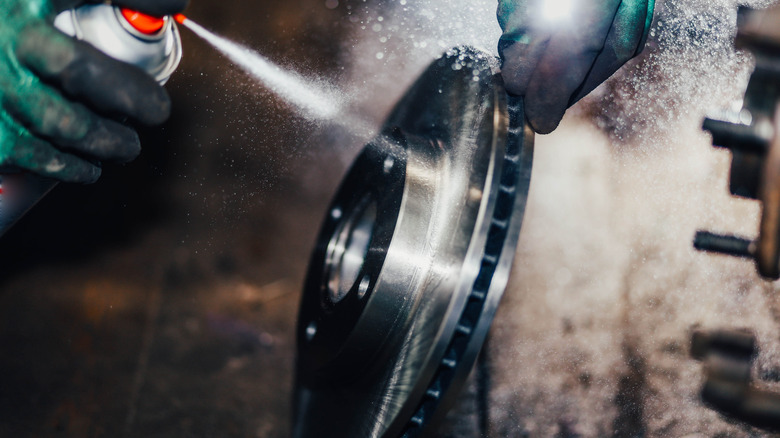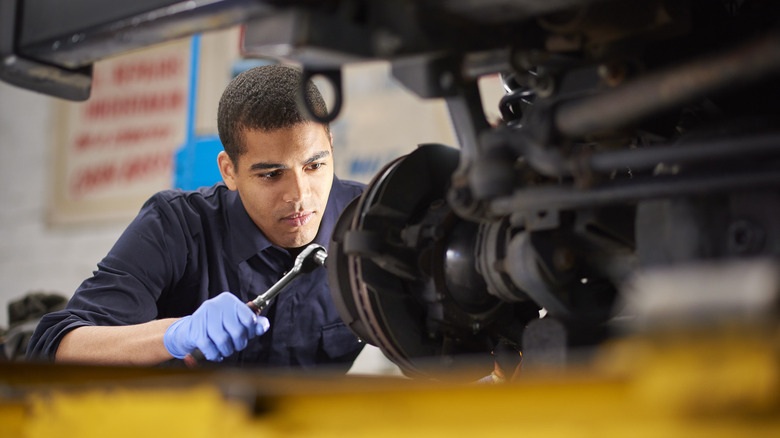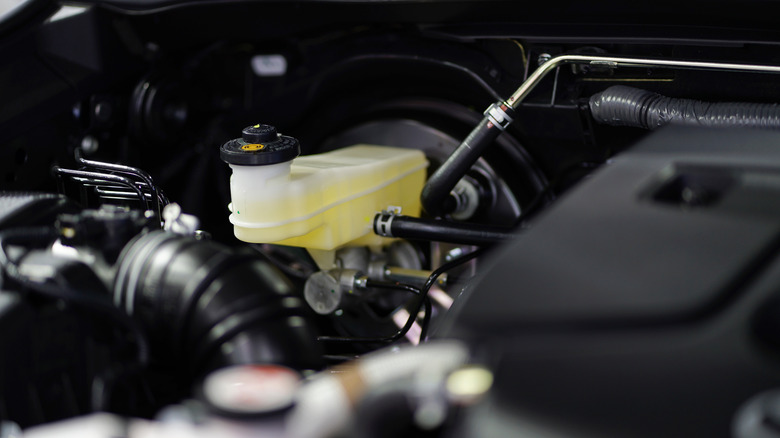Here's Why You Should Never Use Brake Parts Cleaner To Start An Engine
While there's never an opportune moment for engine-starting issues, it's worth knowing what to do if they arise. Even the most reliable vehicles aren't immune to the whims of fate, so all a conscientious driver can do is try to prepare themselves for such an eventuality.
The key is not to suspect the worst if your engine doesn't start and instead take a breath and try some of the standard, familiar methods of getting going — a crank to remedy a flooded engine, for instance. For an ICE, adverse weather conditions are a major factor beyond drivers' control that can prevent an engine from starting and an eventuality for which some of us might have a unique homespun plan: a spray of brake parts cleaner.
For many drivers, it can come as quite a shock that we shouldn't use such a cleaner for this purpose. Here's why a driver might do that, the potential risks, and a better way of resolving any issues you may have with your engine starting.
Why a driver might try to use brake parts cleaner for this purpose
Our vehicles, of course, are hefty and powerful machines. Roughly 6,000 lbs gross weight and above, according to the U.S. Environmental Protection Agency, typically marks a vehicle as a truck for regulation purposes. This can be attributed to the steel-heavy design of the average vehicle, and this in turn can result in some rather heavy-duty cleaning needs. After all, hard-worked metal in key components of a vehicle can get more than a little dirty and worn, and specialist equipment can be required to remove that kind of harsh wear.
This is where brake parts cleaner comes in. It's an easy-to-use product drivers can typically spray where needed, a powerful solvent to break down any potentially harmful build-up on the brakes. Simply remove your tire and apply it where needed, and the accumulated dirt will run away. Unlike some car maintenance solutions, it's relatively cheap and easy to keep accessible, meaning that it's an essential of drivers' car care kits the world over.
It's crucial to note, though, that the harshness of the job can require some harsh chemicals. The New York City Department of Sanitation, according to How Stuff Works, reports that brake cleaners tend to contain the likes of methylene chloride and acetone, so protective measures and careful use are necessary as with any aerosol. Such chemicals have also led to a potentially very dangerous use of brake cleaner to start a vehicle's engine.
The potential dangers of brake cleaner as an engine starter
The theory behind brake cleaner being used as an engine starter in certain scenarios is logical enough: Its flammable components, just as with true engine starting fluid, can help to galvanize the reaction that kicks an ICE into life. Don't make this maintenance mistake, though, because it's hazardous to do so.
Starting fluid, typically with a high ether content, is similarly sprayed (per the manufacturer's instructions) into the air intake of an engine. It is generally intended to be used sparingly, and it must be applied carefully and appropriately for a given vehicle. It's possible to harm a diesel engine (it can cause pre-ignition because the reaction is too fast to be practical) or a two-stroker (the ether can strip away the residual oil a two-stroke engine relies upon) by using it. Even in appropriate cases, a little can go a very long way with starting fluid, and it should probably be considered a very occasional aid during exceptional circumstances rather than being applied most times you set off.
In the auto world, lots of potent cleaning products can come into play, and responsible and appropriate use of them is essential for your vehicle's health and your own. There's a huge potential fire risk in using brake cleaner to start an engine, as there's no official guidance for doing so safely. This is understandable, as this isn't what the product is for.
What should you do if your engine won't start?
There's nothing worse for a driver than an engine refusing to start, and it can often happen with little to no warning. Icy conditions can exacerbate such issues, taking a toll on your battery, and anything from a careful jump start to gentle manipulation with the key and handbrake to release the steering lock may be in order. It's possible to use starting fluid (only and always exactly as advised by the maker) to get yourself rolling, but be mindful of how often you do so.
While starting fluid can certainly be effective for its purpose, it's vital to note that it isn't appropriate for all types of engines and situations, as we've seen. If you do use it, be sure to be mindful of how often you do so. Any reliance on the product can be a convenient and rather ironic indicator that your engine may be damaged or need servicing. Applying WD-40 to your brake components can also be a great danger, similarly preventing you from being alerted to a mechanical issue that may need immediate professional attention.
The most important thing, as ever, is safety first. There's a reason why manufacturers go to great lengths to outline the stringent measures associated with the use of their products, and the risks of starting a fire through inappropriate use of brake cleaner just aren't worth taking.



